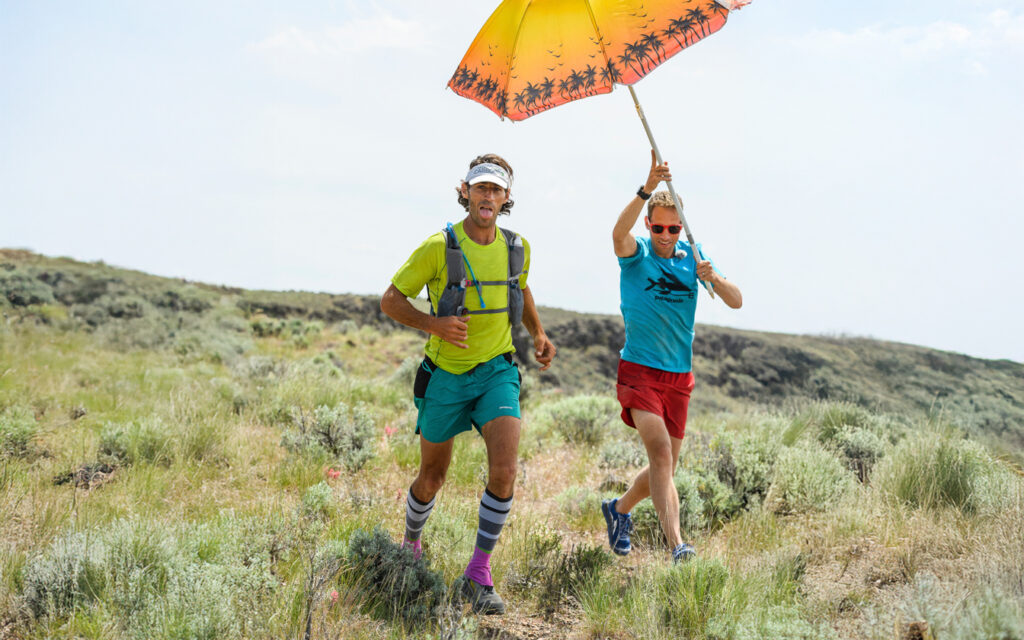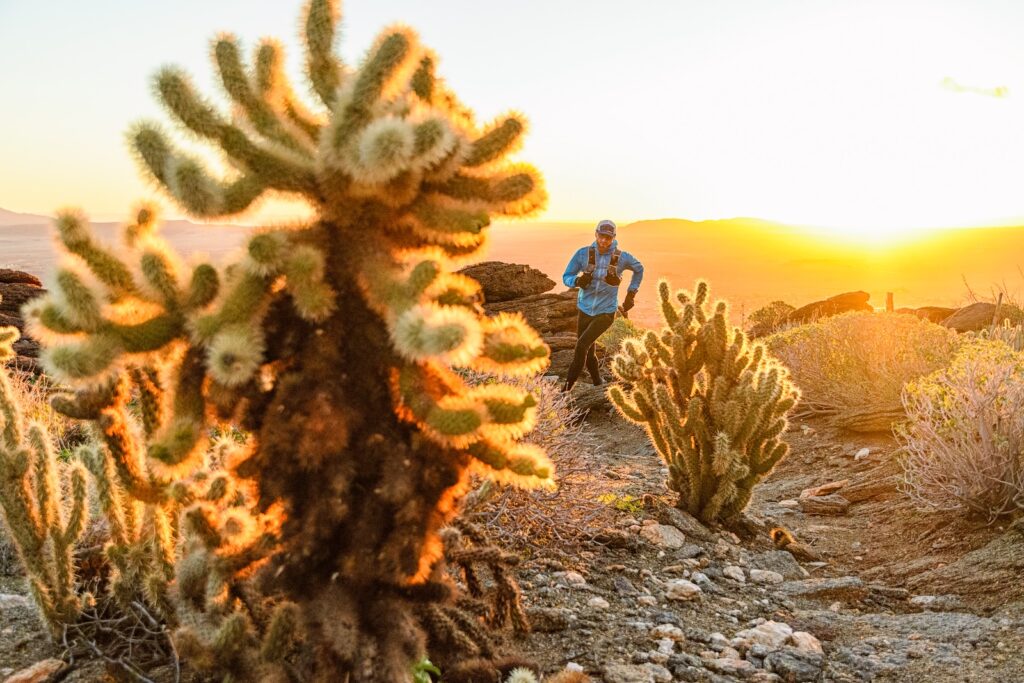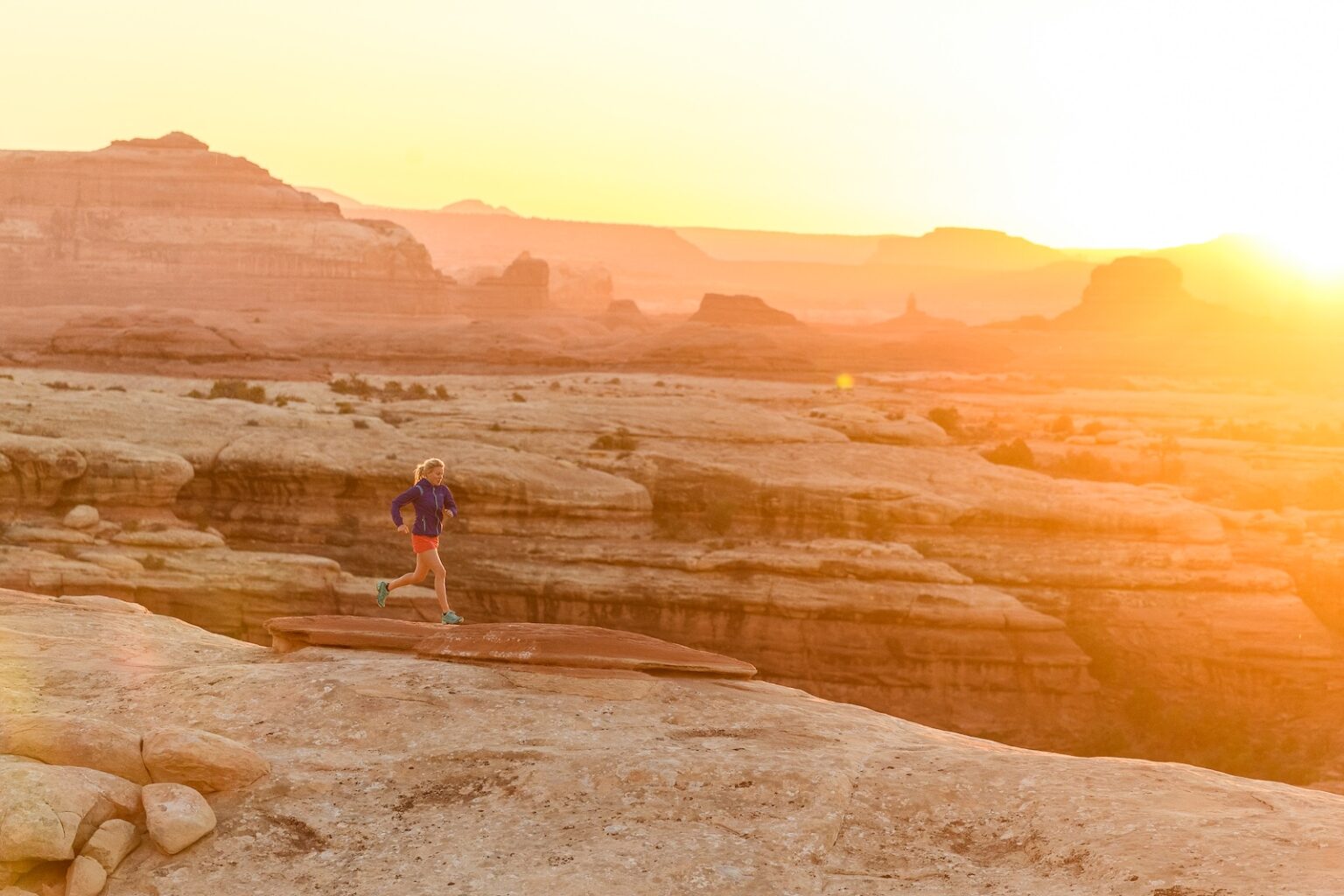If you’ve ever watched your heart rate drift upward while your pace steadily falls on a hot day, you’ve experienced how powerful heat stress can be as a performance limiter.
For mountain and ultra athletes, heat is no longer an occasional inconvenience. Recent climate analyses around major events like Tokyo 2020, Paris 2024 and LA 2028 show a clear trend: more days above 30- 35°C/86- 95°F, more frequent heat waves, and more competitions held near the limits of human thermoregulation. That applies just as much to classic road marathons as it does to UTMB in a hot year, desert stage races, or long alpine days with strong sun and low wind.
The upside is that the same stress that makes training in the heat feel miserable can be used deliberately as a powerful adaptation tool – if you understand what’s going on “under the hood”.
How Your Body Manages Heat During Exercise
During endurance exercise, roughly 75–80% of the energy you produce is lost as heat rather than being used for mechanical work. In cool conditions, this excess heat is relatively manageable: your skin temperature remains lower than than the air temperature, allowing convection and radiation to move heat away, while modest sweating is enough to keep core temperature in check.
In hot conditions – especially when humidity is high – the balance changes. The body relies on three primary mechanisms:
- Increased skin blood flow (vasodilation): more warm blood is sent from the core to the skin to transfer heat outward
- Increased sweating: as air temperature approaches or exceeds skin temperature, evaporation becomes the dominant cooling mechanism.
- Behavioural regulation: you slow down, seek shade, pour water on yourself, or stop the activity.
Sweat is hypotonic (less salty than plasma), so prolonged sweating shifts body water and sodium balance. This can lead to progressive dehydration if you underdrink, or hyponatremia if you overshoot fluid intake in long events.
All of these responses are centrally controlled. Thermal signals from the core and skin feed into the hypothalamus, which ramps up these responses as core temperature rises. This produces a pattern that most endurance athletes recognize in the heat:
- Heart rate is higher at a given pace and often drifts upward over time.
- Pace or powerdrops at the same perceived effort.
- “Easy” climbs suddenly feel like threshold intensity.
A 2025 paper by Gucciardi emphasized that both central autonomic control and perception work together to manage the response to heat. Your brain adjusts both involuntary responses (heart rate, seating) and voluntary decisions (pacing, effort). Heat acclimation modifies both physiological thresholds and perceptual tolerance, shifting physiological thresholds and expanding perceptual tolerance to thermal stress. Sweating onset temperature raises, skin blood flow improves, the thermal comfort range expands- all leading to less perceived discomfort for a given heat load. Heat adaptation reorganizes the system across multiple levels rather than producing a single isolated change.

Why Performance Drops in the Heat
A large body of research shows that exercising in the heat, compared with temperate conditions, leads to:
- Higher cardiovascular strain (higher HR, lower stroke volume at a given workload)
- Higher core and skin temperatures
- Greater reliance on carbohydrate metabolism and faster glycogen use
- Higher perceived effort at a lower absolute workload
Together, these factors lead to earlier fatigue and worse performance in both time-to-exhaustion and time-trial tests in hot conditions. As intensity, duration, core temperature, and dehydration accumulate, the risk of exertional heat illness – from heat exhaustion to exertional heat stroke – also increases.
For endurance athletes, the simple takeaway is:
In the heat, your cardiovascular system is doing two jobs at once: delivering blood to working muscles and sending blood to the skin for cooling.
The more cardiac output that is devoted to cooling, the less remains available for performance.
Hydration, Body Mass Loss, and What It Really Means in the Heat
During prolonged exercise in hot and humid conditions, substantial body mass loss is common and does not automatically indicate dangerous dehydration. In a recent study of the 160-km ultra-endurance race held in high heat and humidity (Grand Raid Reunion), athletes lost on average ~4.8% of body mass, with nearly one-third exceeding 6%. Importantly, there was no relationship found between body mass loss and either core temperature or performance. This aligns with a growing body of evidence that body mass changes during long events reflect far more than fluid loss alone, including:
- glycogen depletion
- metabolic water production
- gastrointestinal content shifts
- sweat retention in clothing
Glycogen is stored with several grams of water per gram (3-4g in most studies), so as glycogen is depleted, water is released (via sweat, urine, respiration) and body mass decreases without any loss of fat or muscle mass.
Practically, this means that moderate weight loss during long, hot efforts can be a normal physiological adaptation rather than a sign of a failed hydration strategy.
Humidity: A Key Driver of Thermal Strain
Humidity is one of the strongest environmental predictors of core temperature, alongside ambient temperature and solar radiation.
High relative humidity severely limits evaporative cooling, even when sweat rates are high. In tropical conditions where humidity ranged from 35–100%, athletes maintained safe core temperatures below 40°C/104°F, but thermoregulation became increasingly dependent on:
- pacing strategy
- terrain exposure
- airflow
This highlights an important distinction: in dry heat, sweating is highly effective, whereas in humid heat the same sweat rate produces far less cooling, forcing athletes to rely more heavily on behavioral strategies such as pacing control, shade management, and strategic cooling at aid stations.
Practical Hydration Strategy: Individualized, Not Weight-Driven
The data strongly supports a shift away from rigid hydration rules based on preventing a fixed percentage of weight loss such as the outdated “no more than 2%” rule. Instead, individualized, thirst-guided hydration appears both safe and effective during prolonged heat exposure. Over-drinking increases the risk of gastrointestinal distress and exercise-associated hyponatremia, while under-drinking—particularly when combined with NSAID use—may elevate kidney stress. The optimal strategy balances thirst perception, urine output awareness, sodium intake, gastrointestinal comfort, and environmental severity, rather than chasing scale numbers during a race or activity.
What Heat Acclimation Actually Changes
The good news is that your body adapts to repeated heat exposure. Exercise-based heat acclimation (HA) is considered the most effective intervention for reducing physiological strain and restoring performance capacity in hot conditions.
McDonald’s quantitative review pooled data from 211 studies and examined how typical heat acclimation protocols affect physiological variables. Most protocols involved roughly 8 sessions of about 90 minutes in hot (~39°C/102°F), moderately humid conditions.
On average, exercise HA produced:
| Resting HR | ↓ ~5 beats/min |
| End-exercise HR | ↓ ~17 beats/min |
| Resting core temp | ↓ ~0.19 °C |
| End-exercise core temp | ↓ ~0.43 °C |
| Plasma volume | ↑ ~5.6% |
| Whole-body sweat rate | ↑ ~163 mL/h |
| Time to exhaustion in the heat | ↑ ~49% |
| Incremental exercise time | ↑ ~14% |
| Self-paced time-trial performance in the heat | ↑ ~3.1% |
In practical terms:
- the cardiovascular system works less hard a given workload.
- core temperature is lower at the same intensity.
- sweat onset is accelerated, sweat rate is elevated, and sweat sodium concentration is reduced.
- athletes can tolerate a given heat load for longer
performance in hot time trials improves by a few percent.
Most of these adaptations occur in the first week, with many reviews suggesting adaptations are largely complete within 10–14 days.
Dose Matters: How much, how often, how long?
When researchers examined how protocol design influenced adaptation, several clear patterns emerged:
- Each additional HA session increased hemoglobin mass ( ~1.9 g) and whole-body sweat rate (~9 mL/h).
- An additional 15 minutes per session further reduced end-exercise core temperature by ~0.04°C/32°F and expanded plasma volume by ~0.4%.
- Hotter and more humid conditions especially boosted sweating adaptations.
Different methods, constant work rate vs. controlled hyperthermia, produced similar reductions in HR and core temperature.
This suggests that coaches have some flexibility in how heat stress is applied. The critical factor is achieving sufficient overall thermal and cardiovascular strain.

Long-Term Heat Training: Beyond the Classic 10-Day Acclimation
Most heat acclimation research focuses on short, intensive protocols lasting one to two weeks. More recent work has asked what happens when heat exposure is extended across several weeks and is integrated into normal endurance training? Lundby and colleagues prescribed a five-week heat block layered onto the regular training of elite female and male cyclists. They observed that hemoglobin mass increased by ~4.0% in women and ~3.5% in men, while muscle metabolism and fiber characteristics remained unchanged. Lactate threshold, VO2max, and short, all-out performance all improved, indicating the primary adaptations were hematological and central rather than muscular.
Similar effects have been observed with passive heat exposure. In well-trained runners, five weeks of hot water immersion, without any changes to training, expanded blood volume, increased cardiac filling, raised hemoglobin mass, and improved VO2max and speed at VO2max.
Taken together, these studies show that longer-term heat exposure, whether active or passive, can drive coordinated hematological and central cardiovascular adaptations that may improve performance even in cool conditions.
Maintenance: Do You Lose It All When You Leave the Heat?
Like fitness, heat adaptations decay once the stimulus is removed. The good news is that they can be maintained with surprisingly little ongoing exposure.
Earlier work in male athletes has shown that 2–3 heat sessions per week can maintain key adaptations in HR, core temperature and performance following an initial HA block.
More recent work by Richard et al. extended these findings to trained female cyclists. After 10 sessions of home-based HA (overdressed cycling), the experimental group then did three weeks of “heat maintenance” – nine extra sessions of overdressed training. Compared with a thermoneutral control group, they found:
- Peak power output increased from pre → mid → post in the heat group, but not the control.
- 20-km time-trial times in 35°C/95°F improved after HA and further improved after the maintenance period.
- VO₂max and core/skin temperatures were stable; sweat rate increased only in the heat group.
- Hemoglobin mass did not change with this medium-length protocol.
This suggests that:
- In women, as in men, maintenance heat sessions can continue to improve hot-weather performance even when VO₂max and Hbmass don’t change.
- For haematological changes, you likely need longer, more intensive blocks (like the 5-week Lundby or Jenkins protocols).
What This Means for Endurance Athletes
Taken together:
- Short HA blocks (7–14 days) reliably lower HR and core temperature, increase plasma volume and sweating, and improve hot-weather performance by a few percent.
- Longer-term heat training (~5 weeks) can increase Hbmass by roughly 3–4% and improve lactate threshold, VO₂max and time-trial performance, even in cool conditions.
- Maintenance exposure (2–3 heat sessions per week) can preserve or even extend many of these benefits.
CONCLUSION: A Coach Perspective
As with every method or intervention, heat is an added stressor that helps to achieve overload and adaptation. Training remains the most important stressor, so heat should be layered carefully on top of an athlete’s training workload. Elite athletes often have the time and resources to absorb the additional stress; amateur athletes might be better served by prioritizing high-quality training and recovery first.
That said, the adaptations from heat exposure are real and substantial – and they help explain why some athletes willingly spend time running on their treadmills while wearing down jackets in overheated basements!
Coming in Part Two
We’ll extend this discussion beyond short-term acclimation and connect heat training to altitude training:
- Where heat and hypoxia overlap – and where they differ.
- When to prioritize heat, altitude, or a combination of both.
- How to integrate heat blocks and maintenance phases around your key races/objectives.
Hypoxic Conditioning Coaching
Table of Contents
INTRO
How Your Body Manages Heat During Exercise
Why Performance Drops in the Heat
Hydration, Body Mass Loss, and What It Really Means in the Heat
Humidity: A Key Driver of Thermal Strain
Practical Hydration Strategy: Individualized, Not Weight-Driven
What Heat Acclimation Actually Changes
Dose Matters: How much, how often, how long?
Long-Term Heat Training: Beyond the Classic 10-Day Acclimation
Maintenance: Do You Lose It All When You Leave the Heat?
What This Means for Endurance Athletes
CONCLUSION
References:
Murray et al. 2018, Fundamentals of glycogen metabolism for coaches and athletes
Bongers, 2024, From Tokyo through Paris to Los Angeles and beyond – Preparing athletes to face the heat of a warming world
Périard, 2021, Exercise Under Heat Stress: Thermoregulation, Hydration, Performance Implications, And Mitigation Strategies
McDonald, 2025, Influence of Exercise Heat Acclimation Protocol Characteristics on Adaptation Kinetics: A Quantitative Review With Bayesian Meta-Regressions
Lundby, 2023, Hematological, skeletal muscle fiber, and exercise performance adaptations toheat training in elite female and male cyclists
Jenkins, 2025, Long-term passive heat acclimation enhances maximaloxygen consumption via haematological and cardiacadaptation in endurance runners
Nybo, 2022, High or hot—Perspectives on altitude camps and heat-acclimation training as preparation for prolonged stage races
Richard, 2025, Three weeks of heat maintenance potentiates the benefitsof heat acclimation in trained females
Gucciardi, 2025, One system, two paths: Unifying autonomic and behavioural thermoregulation via perceptual control

